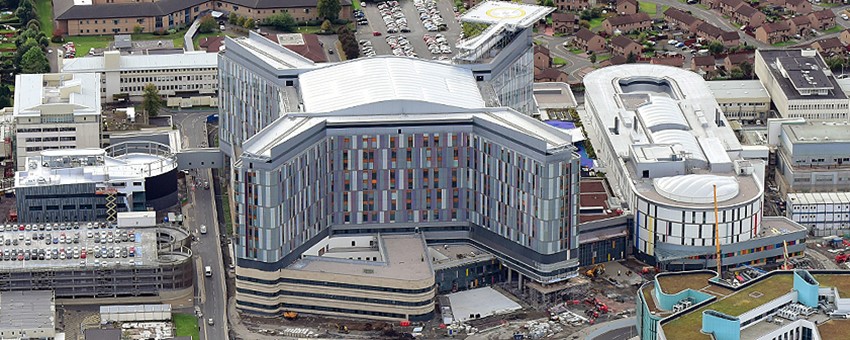
University of Glasgow to Support COVID-19 Response with New Testing Facility
The University of Glasgow will host a major COVID-19 testing facility in Glasgow, in support of current UK and Scottish Governments and NHS efforts against the coronavirus pandemic.
The facility is part of a series of measures to increase testing and response to the spread of COVID-19 across the UK. It will be opened in collaboration with the Scottish Government and industry experts from BioAscent Discovery Ltd and the University of Dundee’s Drug Discovery Unit.
The new testing centre will be able to provide capacity for substantially more COVID-19 tests per day and will be located in the University’s Queen Elizabeth University Hospital Campus. The site, currently the University of Glasgow’s Clinical Innovation Zone, is already designed to meet industrial scale standards and will therefore be able to begin testing in mid-April.
The new testing facility will be staffed on a 24/7 basis by more than 500 volunteers including highly-experienced molecular scientists, technicians and bioinformaticians – all with the relevant skills and experience to carry out COVID-19 testing. All the scientists and technicians involved have volunteered their services to assist the NHS at this critical time.
The Glasgow centre is one of a number of new hub laboratories to be opened in order to increase COVID-19 testing during the crisis. The centres will be coordinated by the Medicines Discovery Catapult, and the project supported by partners Thermo Fisher Scientific, BioAscent Discovery Ltd and the University of Dundee, Amazon, Boots and Royal Mail, alongside the Wellcome Trust.
Professor Dame Anna Dominiczak, University of Glasgow Vice Principal and Head of the College of Medical, Veterinary and Life Sciences, said: “The World Health Organisation has been clear that testing is essential to push back the spread of this new coronavirus. I am pleased that the University of Glasgow can now offer the country this new, large-scale testing facility, in conjunction with our industry partners and the NHS.
“I am incredibly grateful to all colleagues who have volunteered their time, expertise and skills for this testing facility. As a result of their willingness to help, we have a team of highly skilled people, a clinical space and the core equipment to start work alongside our NHS colleagues immediately.”
The Cabinet Secretary for Health and Sport in the Scottish Government Jeane Freeman said: “I am very grateful to Glasgow University and experts from BioAscent and Dundee University, together with the many skilled volunteers who have come forward to work in the centre, for taking the lead in establishing this testing centre. This is clearly a major undertaking. When it becomes operational, the centre will make a significant difference in the fight against the Covid-19 pandemic.”
Professor Sir Anton Muscatelli, Principal of the University of Glasgow, said: “I am indebted to the many people from across our University community who have worked so hard to establish this Centre, but whose hard work is of course only just beginning. I am also very grateful to the Scottish Government’s Cabinet Secretary for Health and Sport, Jeane Freeman, whose support was invaluable; and to the Office for Life Sciences for leading this initiative.
“As we seek to get through this crisis, it is vital that we can marshal all of Scotland’s resources in a great, national effort – and the University of Glasgow will continue to do everything we can to help in the fight against this virus.”
Jane Grant, Chief Executive, NHS Greater Glasgow and Clyde, said: “We were pleased to be able to support the University of Glasgow in the establishment of this testing centre for COVID-19. The University has moved swiftly to set up the facility in their modern laboratory at the Queen Elizabeth University Hospital. This additional capacity will significantly enhance testing capabilities for COVID-19 and is very welcome news.”
The University of Glasgow is also supporting the COVID-19 response with its Centre for Virus Research (CVR), which last week was named as one of 13 key centres in a pan-UK alliance of scientists, working on COVID-19 whole genome sequencing. The Centre will play a key role in the new £20m COVID-19 Genomics UK Consortium, and work with partners to map how COVID-19 spreads and behaves in populations around the UK.